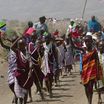Engaruka English Medium Pre-Primary School
Project Complete!
Between 1 and 7 hours are spent in walking 5 to 10kms to fetch for water. This time spent in fetching water causes loss of income to the household especially for women and girls.
Secondly, the diseases caused by use of unsafe water have negative effect on the health and social-economic well-being of the population.
Malaria is the largest morbidity and mortality cause in the district accounting 40.48% of the total illness and deaths. Diarrhea and worms prevalence of 10.57% after malaria and Acute Respiratory Infections. Other water-borne disease prevalence within the district includes schistosomiasis, ascariasis, campylobacteriosis and cholera just to mention the few. Poor sanitation and hygiene practices on the other hand also perpetuate the disease burden and hence household poverty.
Due to a strong causal relationship between infections related to hygiene, sanitation, safe water and water management and other acute illness like anaemia and Hepatitis A&E; it is, therefore, expected that the implementation of the proposed project shall have indirect advantages/results on reducing the possible occurrence of other diseases in the community as substantiated below:
Anaemia-though being a common disease throughout the world, still several infections related to hygiene, sanitation, safe water and water management are significant contributors to anaemia in addition to iron deficiency. These include Malaria (due to poor water management), schistosomiasis and hookworm. In Malaria pandemic areas like Monduli, it is the primary cause of 50% of all severe anaemia cases.
Anaemia can also be caused due to excessive blood loss such as gastro-intestinal infections associated with diarrhea, which is among the leading water-related disease in the district.
Hepatitis A&E is associated with unsafe water supplies and poor sanitation and hygiene leading to infection and inflammation of the liver.
Rehabilitation and extension of water pipe scheme;
Improved sanitation and hygiene practices; and
Empowering communities to maintain the water systems.
Reduce prevalence of water-borne diseases.
Reduce time for collecting water and/or increase use of safe water.
Promote effective community management resulting in improved sustainable water supply.
Promote equitable representation of women in decision-making and management.
Improve knowledge and adoption of good hygiene practices at the schools and surrounding communities.
Extension of 6km pipe scheme.
Construction of storage tanks for water storage and preservation.
Capacity building to water user association to be able to manage water points and repairs.
Promotion and training of hygiene and sanitation
Development of integrated water resource management plan.
The Mtumba approach will be used in sanitation to promote and facilitate activities that will be chosen.
Water Demand Responsive Approach (DRA)–community contributing either cash or in locally available materials during planning, implementation, monitoring and evaluation.
1 water user association established and registered.
3 new water points constructed.
Hygiene and sanitation messages delivered to every project targeted community.
Hygiene education at Engaruka-TX school provided.
Extension of pipe scheme by 5kms.
Improved access to clean and safe water for Monduli District households.
Increased knowledge, attitudes and adoption of good hygiene practices and adoption of improved sanitation facilities.
Improved health through reduced prevalence of waterborne diseases.
Improved water resources management by the communities.
Increased adoption of improved sanitary facilities (latrines) by schools.
Project will use “Mtumba” Hygiene and Sanitation Approach, Child to Child Approach (CtC), and Social marketing of hygienic behavior and sanitation products will be done in response to the community demands. This approach focuses on the following strategies: health education for community sensitization and mobilization; active participation and ownership of the project; and re-activation of appropriate gender sensitive, community structures for households.
H2O for Life partners with experienced NGO organizations around the world that build and support clean water, sanitation, and hygiene education projects in schools. These NGO partners cover half the total cost of every project funded through H2O for Life.
When students raise money for a project, 90% of the funds go directly to the project, and 10% supports the work that makes the project possible. This includes choosing trusted partners, managing funds responsibly, checking on projects, and reporting back so students can see the impact of their work.
This helps ensure every project is done well, stays sustainable, and truly changes lives.
In rare situations, we reserve the right to reallocate funds to alternate project(s).
Questions? Ask us at 651-756-7577 or info@h2oforlifeschools.org.





